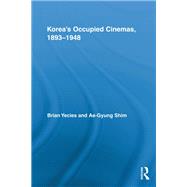- ISBN: 9780203809334 | 0203809335
- Cover: Nonspecific Binding
- Copyright: 5/23/2012
Korea#xE2;#xAC;"s Occupied Cinemas, 1893-1948compares and contrasts the development of cinema in Korea during the Japanese occupation (1910-1945) and US Army Military (1945-1948) periods within the larger context of cinemas in occupied territories. It differs from previous studies by drawing links between the arrival in Korea of modern technology and ideas, and the cultural, political and social environment, as it follows the development of exhibition, film policy, and filmmaking from 1893 to 1948. During this time, Korean filmmakers seized every opportunity to learn production techniques and practice their skills, contributing to the growth of a national cinema despite the conditions produced by their occupation by colonial and military powers. At the same time, Korea served as an important territory for the global expansion of the American and Japanese film industries, and, after the late 1930s, Koreans functioned as key figures in the co-production of propaganda films that were designed to glorify loyalty to the Japanese Empire. For these reasons, and as a result of the tensions created by divided loyalties, the history of cinema in Korea is a far more dynamic story than simply that of a national cinema struggling to develop its own narrative content and aesthetics under colonial conditions.






